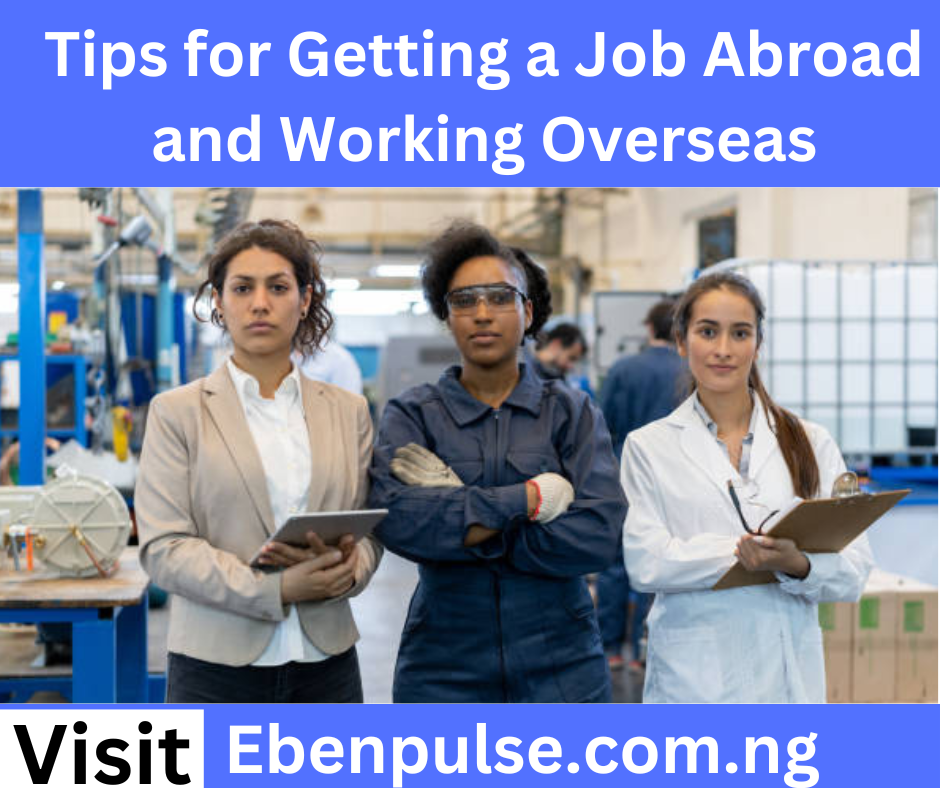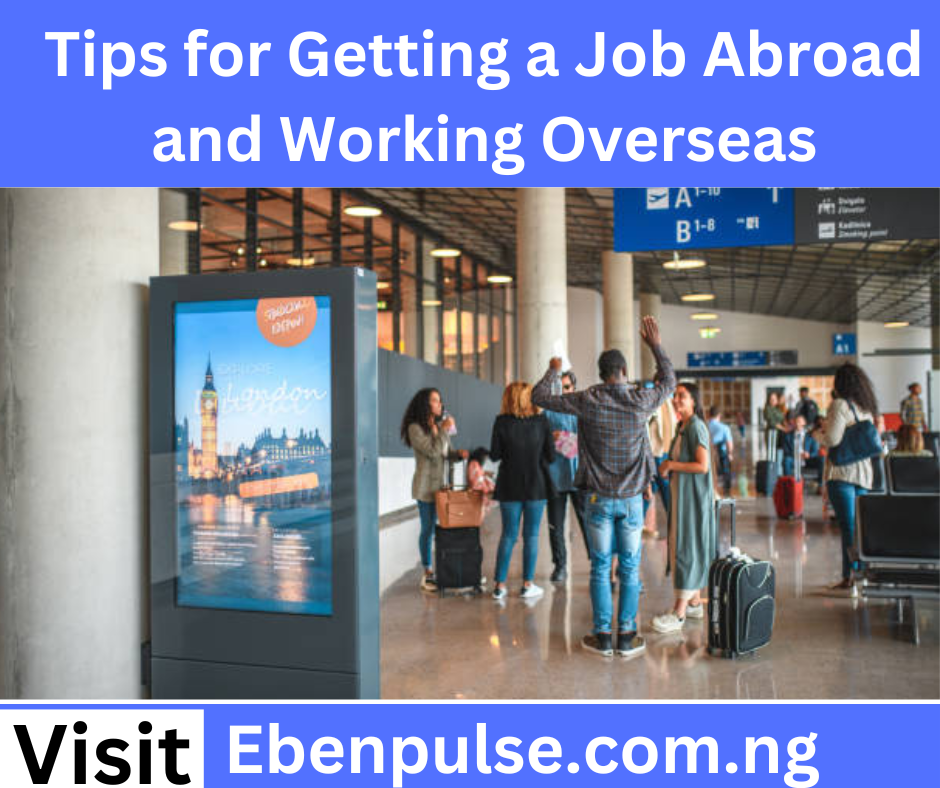
Tips for Getting a Job Abroad and Working Overseas
In an increasingly globalized world, the allure of working and living abroad has captured the imagination of countless individuals seeking new experiences, personal growth, and professional opportunities. While the prospect of immersing oneself in a foreign culture and navigating unfamiliar terrain can be both exhilarating and daunting, the rewards of such an endeavor are truly invaluable. From broadening one’s horizons to developing intercultural competence and gaining a competitive edge in the global job market, the benefits of working overseas are manifold.

However, embarking on this journey requires careful planning, research, and a strategic approach. From understanding visa requirements and navigating cultural nuances to networking effectively and showcasing transferable skills, there are numerous considerations to keep in mind. This comprehensive article aims to provide a comprehensive guide for those aspiring to work abroad, offering practical tips and insights to navigate the complexities of securing employment in a foreign country.
Define Your Goals and Priorities
Before embarking on your international job search, it is crucial to define your goals and priorities. Ask yourself questions such as: What are your motivations for working abroad? Are you seeking personal growth, career advancement, or a specific lifestyle? What regions or countries interest you the most, and why? By clearly articulating your objectives, you can tailor your job search and ensure that the opportunities you pursue align with your aspirations.
Moreover, consider your desired work-life balance, financial requirements, and long-term career aspirations. Working abroad often involves navigating different cultural norms, work environments, and personal circumstances. Establishing clear priorities will help you evaluate potential job opportunities more effectively and make informed decisions that align with your overall vision for the future.
Research and Understand Cultural Differences
Embracing cultural diversity is an integral part of the overseas work experience. Each country and region has its unique customs, values, and communication styles, which can significantly impact your professional interactions and personal life. By researching and understanding these cultural nuances, you can better prepare yourself for the challenges and opportunities that lie ahead.
Start by reading about the history, traditions, and societal norms of the countries that interest you. Seek out resources such as travel guides, cultural blogs, and expatriate forums to gain insights from those who have lived and worked in your desired destination. Additionally, consider taking language classes or participating in cultural immersion programs to develop a deeper appreciation for the local language and customs.
Understanding cultural differences will not only help you navigate professional and personal interactions more effectively but also demonstrate your commitment and respect for the host country. Employers often value candidates who possess intercultural competence and can adapt seamlessly to diverse work environments.
Build a Strong Professional Network
Networking is a powerful tool in any job search, but it becomes even more crucial when seeking employment abroad. Building a strong professional network can open doors to opportunities, provide valuable insights, and facilitate connections with potential employers or industry professionals in your target country.
Start by leveraging your existing network, including friends, family members, colleagues, and alumni associations, to identify individuals with international connections or experience working abroad. Attend industry events, join professional organizations, and participate in online forums or social media groups related to your field and desired location.
Additionally, consider reaching out to expatriate communities or professional associations in your target country. These groups can offer invaluable advice, share job listings, and potentially introduce you to local contacts or companies actively seeking international talent.
Remember, networking is a two-way street. Be prepared to offer assistance or share your own knowledge and experiences when possible. Building genuine connections and maintaining a positive reputation within your network can significantly enhance your chances of securing a job abroad.
Highlight Transferable Skills and International Experience
When applying for jobs abroad, it is essential to highlight your transferable skills and any international experience you may have. Employers overseas often seek candidates who can seamlessly adapt to new environments, navigate cultural differences, and bring a unique perspective to their organization.
Review your resume and cover letter to emphasize skills such as cross-cultural communication, language proficiency, adaptability, problem-solving, and the ability to work in diverse teams. Highlight any study abroad programs, international internships, volunteer work, or travel experiences that demonstrate your willingness to embrace new challenges and your ability to thrive in multicultural settings.
If you lack direct international experience, focus on showcasing your transferable skills and eagerness to learn. Emphasize your flexibility, open-mindedness, and commitment to personal and professional growth. Employers often value candidates who possess a growth mindset and are eager to embrace new challenges and experiences.
Tailor Your Job Search Strategy
Customizing your job search strategy is crucial when seeking employment abroad. Job search techniques and platforms can vary significantly from country to country, and what may be effective in one region may not yield the same results in another.
Begin by researching the most popular job search platforms, recruitment agencies, and job fairs specific to your target country or region. Many countries have their own job portals, industry-specific job boards, or even local newspapers that advertise job openings. Familiarize yourself with these resources and create profiles or accounts as needed.
Additionally, consider leveraging social media platforms like LinkedIn, which can be an invaluable tool for connecting with professionals, companies, and job opportunities worldwide. Engage with relevant industry groups, follow companies of interest, and actively participate in discussions related to your field or desired location.
Furthermore, explore alternative job search strategies such as attending virtual or in-person job fairs, reaching out to recruitment agencies specializing in international placements, or directly contacting companies in your target country to inquire about open positions or speculative applications.
Obtain Necessary Visas and Permits
Navigating the visa and work permit requirements for your desired destination is a critical step in securing a job abroad. Each country has its own set of regulations and processes, and failing to comply with these requirements can jeopardize your employment prospects and legal status.
Start by researching the specific visa and work permit requirements for the country or countries you are interested in. Consult official government websites, embassy or consulate resources, and seek guidance from immigration lawyers or professionals who specialize in international employment law.
Be prepared to gather the necessary documentation, such as proof of employment, educational credentials, medical records, and financial statements. Some countries may also require language proficiency tests, criminal background checks, or specific skill certifications.
It is essential to initiate the visa and permit application process well in advance, as these procedures can be time-consuming and may involve multiple steps or interviews. Additionally, consider seeking guidance from your potential employer, as many companies offer assistance or sponsorship for international hires.
Prepare for the Interview Process
Interviewing for a job abroad can present unique challenges and cultural nuances that require careful preparation. From understanding local communication styles and etiquette to addressing potential concerns about your ability to adapt to a new environment, being well-versed in the interview process is crucial.
Research common interview practices and expectations in your target country. In some cultures, directness is valued, while in others, a more indirect or subtle approach may be preferred. Familiarize yourself with local norms regarding punctuality, dress code, and appropriate topics of discussion.
Practice responding to potential interview questions that may arise, such as your motivation for relocating, your ability to adapt to a new culture, and your strategies for overcoming language barriers or cultural differences. Be prepared to showcase your knowledge of the local customs, traditions, and business practices, demonstrating your commitment to seamlessly integrating into the new environment.
Additionally, consider conducting mock interviews or seeking feedback from individuals familiar with the cultural context of your target country. This practice can help you refine your communication style, body language, and overall presentation to align with local expectations.
Build a Solid Relocation Plan
Once you have secured a job offer abroad, it is crucial to develop a comprehensive relocation plan. Moving to a new country involves numerous logistical considerations, such as finding housing, arranging transportation, obtaining necessary documentation, and managing finances.
Start by researching the cost of living, housing options, and transportation systems in your new location. Consider factors such as proximity to your workplace, access to amenities, and overall safety. Explore rental platforms, real estate agents, or expatriate communities that can provide valuable insights and assistance in securing suitable accommodation.
Arrange for the shipment or storage of your personal belongings, ensuring that you comply with any import regulations or restrictions. Additionally, research healthcare options and insurance requirements, as well as any necessary vaccinations or medical preparations specific to your destination.
Furthermore, develop a financial plan that accounts for potential upfront costs, such as security deposits, temporary housing, and moving expenses. Consult with financial advisors or tax professionals to understand any tax implications or financial considerations related to working and living abroad.
Embrace Cultural Immersion and Adaptation
Upon arriving in your new country, it is essential to embrace cultural immersion and actively work towards adapting to your new surroundings. This process involves more than just learning the language and customs; it requires an open mindset, a willingness to step outside your comfort zone, and a genuine appreciation for cultural diversity.
Immerse yourself in the local community by participating in cultural events, exploring local cuisine, and engaging with locals. Seek out opportunities to learn about the history, traditions, and social norms .
Conclusion
In conclusion, Working abroad is a life-changing experience that offers personal growth, professional development, and a unique opportunity to immerse oneself in diverse cultures. While the journey can be both exhilarating and challenging, the rewards of living and working in a foreign country are truly invaluable.
By following the tips outlined in this comprehensive guide, you can increase your chances of securing a fulfilling job abroad and navigating the complexities of an international work experience. From defining your goals and priorities to researching cultural differences and building a strong professional network, each step is crucial in preparing you for the adventure that lies ahead.
Remember, the key to success is adaptability, open-mindedness, and a genuine appreciation for cultural diversity. Embrace every opportunity to learn, grow, and immerse yourself in the local customs and traditions. This mindset will not only enrich your personal and professional journey but also demonstrate your commitment and respect for the host country, qualities that are highly valued by employers worldwide.
Working abroad is not just about finding employment; it’s about embarking on a transformative journey that broadens your horizons, develops your intercultural competence, and equips you with the skills and experiences to thrive in an increasingly globalized world. Embrace the challenges, seize opportunities for growth, and allow this experience to shape you into a more resilient, culturally aware, and globally minded individual.
The road ahead may be paved with obstacles and uncertainties, but the rewards of working overseas are truly priceless. Every cultural exchange, every professional challenge, and every personal triumph will contribute to your personal and professional development, leaving an indelible mark on your life’s journey.
So, take the leap, embrace the unknown, and embark on this incredible adventure. The world is waiting to be explored, and the experiences you gain while working abroad will undoubtedly shape your future in ways you never imagined.